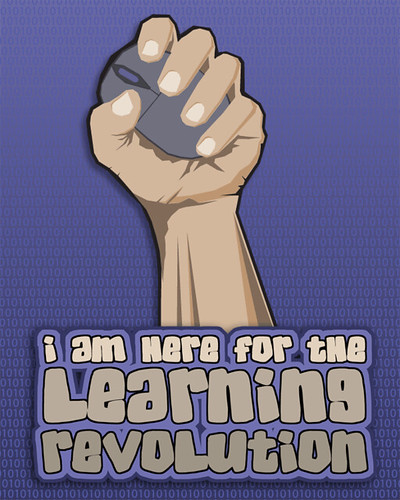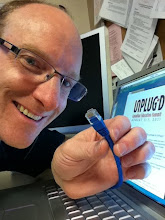 Since long before his birth, I've been working as a change agent, leading educators to consider creative alternatives to traditional paper, pencil, and chalkboard education. Like-minded members of the edu-blogosphere who are similarly calling for change, are articulate, innovative, and professional, though widely scattered. How can this group of charismatic change agents come to act in a collectively?
Since long before his birth, I've been working as a change agent, leading educators to consider creative alternatives to traditional paper, pencil, and chalkboard education. Like-minded members of the edu-blogosphere who are similarly calling for change, are articulate, innovative, and professional, though widely scattered. How can this group of charismatic change agents come to act in a collectively?Seed #1: A Vision for Coming Together
Clarence Fisher has posted an idea for creating an international organization of educators with a common purpose...
"If we begin to think of ourselves like this, as an organization, an international network of educators who are all pursuing the same basic goals (educational change to meet the demands of the twenty first century, the infusion of technology into teaching, openness and transparency, etc) we are a group that is at least several thousand people who just happen to be spread out across the globe."
In order to support 'the cause', Clarence proposes that this community could hire a writer- researcher- public relations person with responsibility for coordinating the group's communications, while supporting individuals in their efforts to innovate and educate. In support of this idea, he has created a 'tipping point' fund-raising project called "Reinventing Education"
Seed #2 Clarity of Purpose
Whether the revolution is about engaging modern tools for education, or about employing strategies for networked learning, or about 'learning to change', Sir Kenneth Robinson's presentation to educational leaders at the Apple Education Leadership Summit 2008, reminds us that 'creativity' is a critical component of any person's education. With the guarantee of an unpredictable future, any educational revolution must recognize the need to engage our creative minds. Video courtesy of Edutopia.org
Seed #3: Radicals as Visionaries
The most creative in the education community will always be seen as 'radicals', maybe even as 'rock stars', but I share discomfort with the evolving Edupunk meme as expressed by both Doug Belshaw and David Warlick. As highlighted by Stephen Downes, and others, these non-traditional, creative educators are working independently in their own personal struggles for change. These educators could play catalytic roles in the revolution, especially if they can be brought together under a common banner.
Seed #4: It Starts Small... but Universally
I'm not sure, but I suspect that conversations are the primary way that a revolution gains a foothold. Already, conversations about what the change should look like, are underway throughout the blogosphere, but to truly gain leverage in schools around the world, the discussions need to move offline... into staff rooms and classrooms.
Are there other 'seeds' we need to sow? How will you participate in the discussion? How can we engage other change agents? When and Where will we meet?
A few more ideas on this topic are shared on the Edupunk Episode of the Teacher 2.0 Podcast.
Photo Credit: "I'm Here for the Learning Revolution" was created by Bill Moseley, based on a button competition launched by Scott McLeod and Wesley Fryer. The design will be highlighted at NECC in San Antonio.




2 comments:
Here's the dilemma: groups that are "for change" usually fall apart when forced to voice their own specific platform of things they DO stand for, rather than just things they are against. You begin to get at that with the use of technology, but what kind of "transparency" are we as a group going to promote? What else do we stand for?
What else do we stand for?
That's a great question Mark. I'm wondering where such a 'constitution' might be developed? Would it be shared via media, with an audience wider than the Internet?
This might be a good starter:
http://www.youtube.com/watch?v=tahTKdEUAPk
Post a Comment